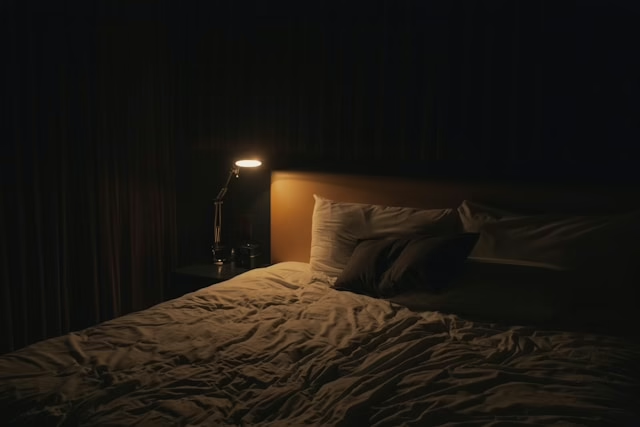🌗 Where nervous system wisdom rewrites the perimenopause playbook—part of The Reckoning Years series.
You’re dead tired… until your head hits the pillow.
Or you fall asleep but bolt awake at 3:17 a.m. like a startled deer.
You try herbs, melatonin, even sleep hygiene rituals—yet still feel like a zombie in a broken loop.
You collapse into bed and your brain lights up like a slot machine. Or you fall asleep quickly, only to bolt awake at 2:47 a.m. with a pounding heart and a restless mind. Even when you manage a full eight hours, you wake foggy, flat, and somehow less restored than when you started.
Sound familiar?
Perimenopausal sleep chaos isn’t random—it’s an intelligent system struggling to stabilize.
Sleep Is a Nervous System Skill
You can’t think your way into it.
You have to train your body to feel safe enough to drop into repair mode.
And in perimenopause? That signal gets messy fast.
What’s Disrupting Your Sleep Isn’t “Just Hormones”
Perimenopausal sleep chaos isn’t random—it’s your body attempting to recalibrate in a terrain that’s lost its buffers. For decades, estrogen and progesterone acted as a stabilizing duet for brain chemistry, metabolism, and circadian rhythm. Now that duet turns into a jagged remix.
Estrogen drops ripple into serotonin decline, leaving melatonin production unsteady. That’s why your sleep feels more like crossing a shaky bridge than slipping into rest.
Progesterone loss weakens GABA, the brain’s brake pedal. Without that cushion, even minor stressors echo louder.
Cortisol—the survival hormone—starts arriving on the wrong schedule. It spikes at night if you’ve skipped meals, stayed braced in sympathetic mode, or lived too long on borrowed adrenaline.
Blood sugar volatility adds another twist. Midnight drops trigger emergency cortisol surges, jolting you awake as if from a nightmare.
Histamine surges—once tempered by estrogen—now arrive unchecked, fueling heat, anxiety, and bizarre dreams.
And the gut? It makes 90% of your melatonin. If your microbiome is inflamed, your rhythm will be too.
This is not random. It’s predictable terrain overload—a misfired loop between your hormones, nervous system, and environment.

It’s Not Just Insomnia — It’s a Mismatch
Perimenopause is a threshold state. Your system is trying to recalibrate hormones, circadian rhythm, temperature, glucose, and emotional charge—all at once.
Sleep gets sacrificed first when capacity is low.
Your body isn’t fighting you. It’s trying to buffer you through chaos.
What Actually Helps (and Isn’t Overhyped BS)
- Protein-rich breakfast. Skipping this = blood sugar hell = cortisol surges at night.
- Screens off 90 minutes before bed. Blue light hijacks melatonin. You know this. Now do it.
- Cool down. Warm bath followed by a cool bedroom. Hot flashes ≠ sleep-friendly.
- Nervous system resets in the evening. Try legs-on-wall, facial oiling, or paced breathing.
- No more caffeine after 11am. You’re not 25. Deal with it.
Through the Vital Clarity Code Lens
🌱 Regulate
The first move isn’t to sedate yourself into unconsciousness—it’s to stabilize the terrain. Rhythm tells the nervous system, “This is light, this is dark, this is safe.” Morning light within 15 minutes of waking. Protein-rich breakfast to cut the cortisol spikes. Consistent meal timing so blood sugar doesn’t crash overnight. Evening downshifts that signal the brain it’s allowed to let go. You’re not training your brain—you’re retraining your timing.
🌀 Rewire
Once rhythm cues are consistent, the deeper loops can repair. Estrogen fluctuations distort temperature control and disrupt sleep spindles. Progesterone loss removes the GABA cushion. Clearance matters: if the liver and gut don’t process estrogen, it lingers and spikes again. Rewiring here means supporting exits (bowel rhythm, bile flow), replenishing mitochondria, and reducing daytime sympathetic overdrive. Sleep isn’t forced—it’s allowed when the interference is removed.
🔥 Reclaim
Here’s where we cut the shame. Fatigue makes you believe you’re lazy, undisciplined, or failing. But perimenopause fatigue is capacity bankruptcy, not moral weakness. Reclaiming sleep means letting your body—not your calendar—decide when repair is needed. Deep rest is not indulgence. It’s the most honest signal your body can give that margin must return.
✨ Resonate
Imagine waking with steadiness instead of dread. Imagine your mornings no longer haunted by fog but anchored by clarity. This isn’t fantasy—it’s coherence re-emerging as your nervous system learns to trust the rhythm again. The nights don’t become perfect. They become quieter. And that’s enough.
🪶Micropractice: Dark and Down
At least 30 minutes before bed:
- Dim all lights
- Cover anything that glows
- Put your phone in sleep mode
Then sit or lie still.
Hands over your lower belly.
Say aloud:
“I am allowed to power down.”
Repeat for 3 slow breaths.
This isn’t about forcing sleep—it’s about teaching your system how to descend.
TL;DR
You’re not bad at sleeping.
You’re mis-signaled and under-supported.
Midlife hormones don’t just change your cycle—they change your clock.
When the nervous system gets scrambled cues, sleep becomes fragmented.
You don’t need more melatonin.
You need margin, rhythm, and clear signals.
Your siren isn’t random—it’s a roadmap.
I’ll help you read the signals and reclaim your capacity.
Explore the Vital Signal Check →
This article sits inside the Perimenopause Hub — where symptoms stop being problems,
and start being signals of capacity, hormones, metabolism, and nervous system load.
Explore the Perimenopause Hub →
Also see the Sleep Hub for CO₂, circadian rhythm & night waking →
